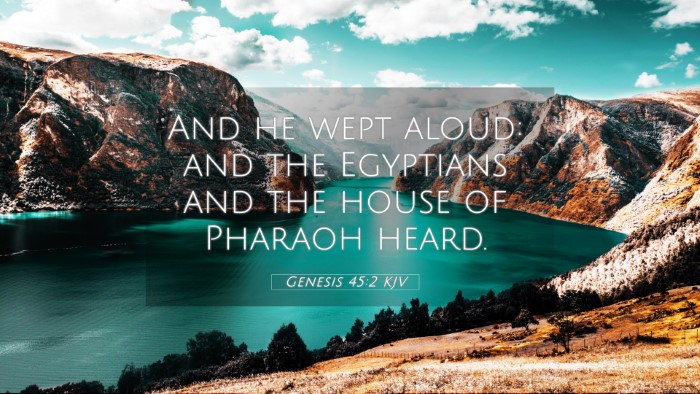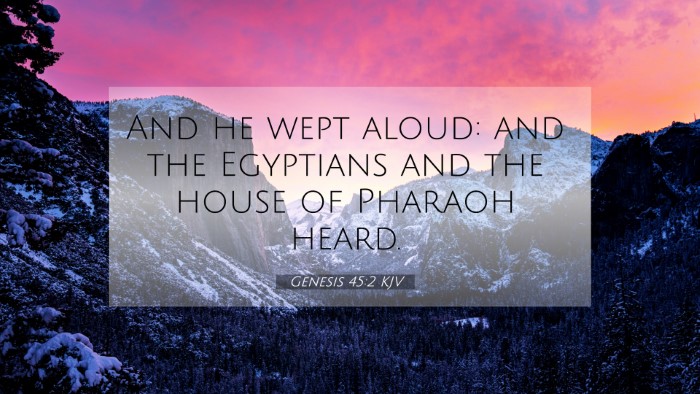Understanding Genesis 45:2
Genesis 45:2 states: "And he wept aloud: and the Egyptians and the house of Pharaoh heard." This verse captures a critical moment in the narrative of Joseph’s life, highlighting profound emotions and the reconciliation with his brothers.
Contextual Analysis
This verse follows Joseph's revelation of his identity to his brothers, after years of separation and hardship. The emotional weight of this moment signifies not only personal restoration but also broader themes of forgiveness and divine providence.
Combined Insights from Commentaries
-
Matthew Henry:
Henry emphasizes the deep emotional reaction of Joseph, interpreting his weeping as a manifestation of both joy and the release of pent-up sorrow. He argues that it reflects the beauty of forgiveness, as Joseph chooses reconciliation over resentment.
-
Albert Barnes:
Barnes focuses on the societal implications. He notes that Joseph’s loud weeping not only expresses personal feelings but also serves as an impactful moment that is heard by those around him, thus reinforcing the significance of familial bonds and restoration.
-
Adam Clarke:
Clarke highlights the cultural context, suggesting that Joseph's tears were a customary expression of grief and joy in ancient Near Eastern cultures. He interprets this scene as a pivotal emotional climax providing insight into Joseph's inner life.
Thematic Connections
Joseph’s tears in Genesis 45:2 connect to several key themes in scripture:
- Forgiveness: Joseph's reconciliatory act mirrors Christ's teaching of forgiveness in the New Testament.
- Divine Providence: The cumulative events leading to this moment underscore God’s guiding hand throughout Joseph’s narrative.
- Family Restoration: The reunion serves as an archetype of healing within families, reflecting God’s desire for reconciliation.
Cross References
Several other verses connect with Genesis 45:2, enriching our understanding:
- Genesis 50:20 - "But as for you, ye thought evil against me; but God meant it unto good..." - Highlights God’s purpose behind suffering.
- Psalms 30:5 - "Weeping may endure for a night, but joy cometh in the morning." - Illustrates the transition from sorrow to joy.
- Matthew 18:21-22 - Jesus' teaching on limitless forgiveness complements Joseph’s actions.
- Luke 15:20 - The prodigal son’s return mirrors the themes of grace and reconciliation present in Joseph's story.
- Romans 8:28 - "And we know that all things work together for good..." - Echoes the overarching message of God’s providence.
- 2 Corinthians 5:18 - "And all things are of God, who hath reconciled us to himself..." - Highlights the theme of reconciliation in a Christian context.
- Ephesians 4:32 - Encouragement to forgive one another as God forgives us, linking to Joseph's choices.
Conclusion
Genesis 45:2 encapsulates a moment of emotional complexity and divine narrative fulfillment. The interplay of personal emotion, societal implications, and theological themes showcases the rich layers of meaning found in this verse. The cross-references listed not only deepen our understanding but also connect believers through the overarching narrative of redemption and reconciliation intrinsic to the Bible.
Exploring Cross-Referencing in Your Study
Utilizing tools for Bible cross-referencing can uncover thematic connections that enrich your understanding of scripture. Consider employing a Bible concordance or Bible cross-reference guide to delve deeper into scripture. Resources like Bible reference resources and detailed studies can help to clarify how verses relate to one another.
Further Study Methods
- Use cross-reference Bible study methods to identify relationships and parallels between verses.
- Explore Bible chain references to navigate through interconnected scriptures.
- Conduct a comparative study of Pauline epistles to observe contrasting views on reconciliation.
For more insights, consider how identifying connections between the Old and New Testament can enrich your biblical knowledge. Peters and writers throughout the Bible echo themes of emotion, family, and forgiveness, providing a comprehensive view of God’s message to humankind.







